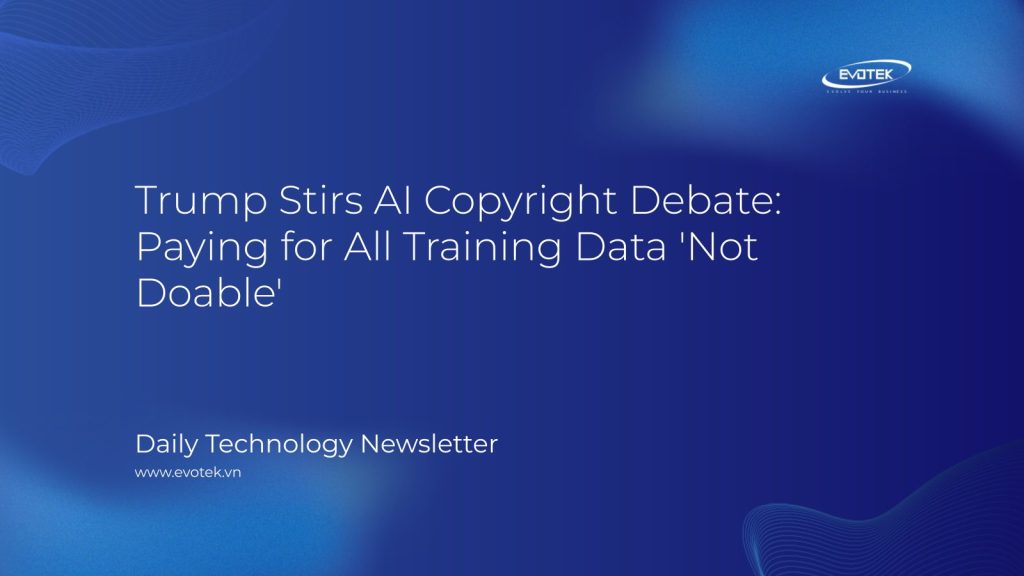During the recent “Winning the AI Race” summit, former President Trump weighed in on the contentious debate surrounding artificial intelligence and intellectual property. He asserted that it is “not doable” for AI companies to fully compensate for every piece of copyrighted content utilized in their model training processes. This stance emerges amid a wave of ongoing AI copyright lawsuits and aims to bolster the United States’ competitive edge in the global AI arena, particularly against nations like China.
The Rapid Evolution of AI and Copyright Challenges
The past few years have witnessed an unprecedented acceleration in AI technology, notably with the development of large language models. These models thrive on vast datasets of text, where quantity and diversity are key to their performance and capabilities.
As AI gained mainstream prominence, a significant conflict arose: content rightsholders discovered their works—ranging from millions of books, articles, and musical compositions to vast photo libraries—were being used for AI training without explicit permission or compensation. This has ignited dozens of lawsuits in U.S. courts, centering on a fundamental disagreement.
AI companies typically argue that using copyrighted works as input for model training falls under “fair use,” a legal doctrine allowing limited use of copyrighted material without permission. Conversely, rightsholders vehemently disagree, demanding compensation for the use of their valuable intellectual property. With billions of dollars at stake, this complex legal question could ultimately reach the Supreme Court, or potentially be addressed through new legislation.
Trump’s Stance: A Pragmatic Approach to AI Development
President Trump articulated his position clearly during the summit, emphasizing the impracticality of universal payment for training data.
“You can’t be expected to have a successful AI program when every single article, book or anything else that you’ve read or studied, you’re supposed to pay for. You just can’t do it because it’s not doable,” Trump stated, drawing an analogy to human learning. “When a person reads a book or an article, you’ve gained great knowledge. That does not mean that you’re violating copyright laws or have to make deals with every content provider.”
Trump’s comments primarily address the issue of copyrighted material used as input for AI models, distinguishing it from AI output that might reproduce copyrighted works. While some AI firms have pursued licensing agreements, many have reportedly utilized unauthorized datasets, including those sourced from so-called “shadow libraries.”
The Global AI Race: Lessons from China and Shadow Libraries
The discussion also touched upon the international landscape of AI development and copyright. Anna’s Archive, a prominent shadow library, previously indicated that it provides high-speed data access to numerous AI companies and data brokers, many based in China. Anna’s Archive has asserted that unrestricted data access is crucial for national relevance in the AI race, framing it as a matter of national security.
President Trump acknowledged these global dynamics, explicitly suggesting that China’s approach does not involve paying for all copyrighted material. “China’s not doing it,” he noted, advocating for a level playing field. “You have to be able to play by the same set of rules.” However, he clarified that this does not imply AI should be allowed to reproduce copyrighted works.
“Of course, you can’t copy or plagiarize an article, but if you read an article and learn from it, we have to allow AI to use that pool of knowledge without going through the complexity of contract negotiations, of which there would be thousands for every time we use AI.”
Acknowledging Opposition and Future Outlook
Trump admitted that his position might not be universally popular, anticipating pushback from certain sectors. “I was told before I got up here, this is an unpopular thing because some people, they don’t want that. But I want you to be successful,” he concluded, underscoring his belief that this stance is necessary for AI advancement.
These remarks follow recent ‘fair use’ victories for companies like Meta and Anthropic in U.S. courts, yet the intricate nature of AI copyright remains largely unsettled. It is currently unclear whether the U.S. administration intends to propose specific legislation to clarify these issues. Furthermore, a final ‘fair use’ ruling may not resolve all AI-related copyright disputes, as separate allegations exist regarding companies actively distributing pirated books as part of their data collection processes.
The future of AI development hinges significantly on how these fundamental intellectual property questions are resolved, balancing innovation with the rights of creators in the digital age.
Related Articles on AI and Copyright:
- Meta Secures Bittersweet Fair Use Victory in AI ‘Piracy’ Case
- AI-Powered News Piracy Site Blocked By ISPs After Court Sides With Publishers
- Meta AI ‘Piracy’ Lawsuit: Publishers and Professors Challenge Fair Use Defense

 日本語
日本語 한국어
한국어 Tiếng Việt
Tiếng Việt 简体中文
简体中文